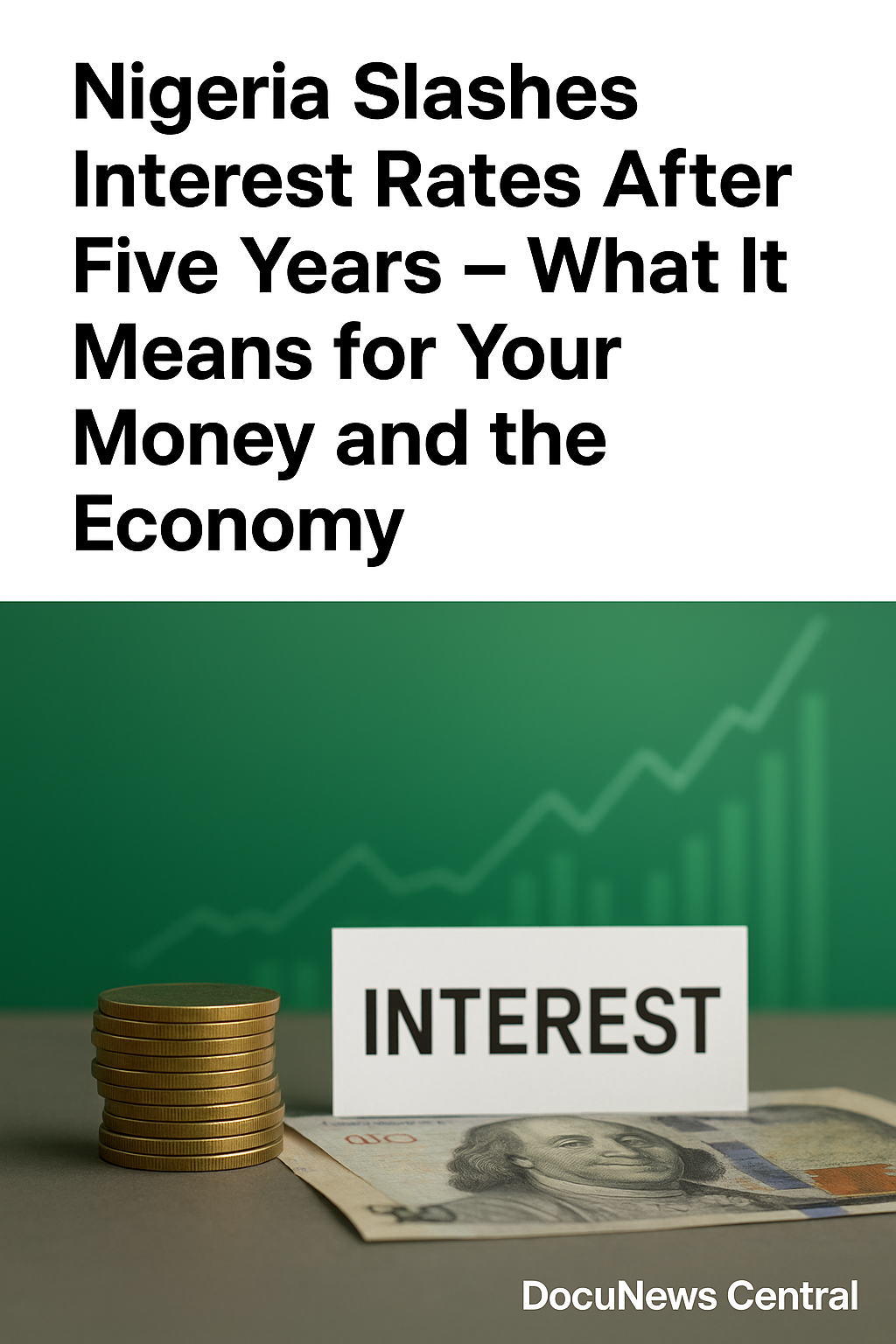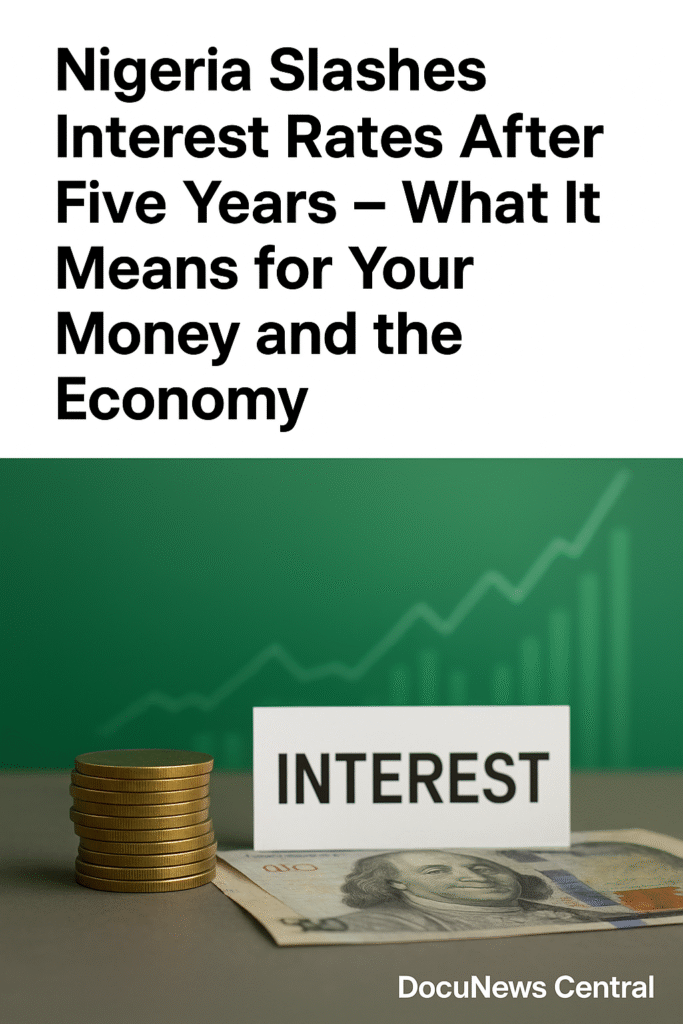

Nigeria Slashes Interest Rates After Five Years – What It Means for Your Money and the Economy
A Landmark Monetary Policy Shift
For the first time in half a decade, Nigeria’s Central Bank has finally loosened its grip on interest rates. On Tuesday, the Central Bank of Nigeria (CBN) announced a surprise 0.5 percentage point cut to its benchmark interest rate, bringing it down to 27 percent.
This bold step breaks a five-year cycle of relentless monetary tightening, a period marked by rising borrowing costs and a tough environment for businesses and households alike. With inflation finally showing signs of cooling, the CBN believes now is the right moment to give the economy a boost. But what does this historic move really mean for ordinary Nigerians, businesses, and the wider economy?
Why the CBN Finally Pulled the Trigger
Bidvertiser2102066
For years, Nigeria has battled stubbornly high inflation, driven by food price spikes, currency fluctuations, and rising global energy costs. To tame these pressures, the Central Bank pursued a hawkish monetary policy—continually raising interest rates to discourage excessive borrowing and slow down price growth.
Now, after months of gradual moderation in headline inflation, the latest data shows a more stable naira and a noticeable drop in food price volatility. Economists say this created room for the CBN to ease rates without reigniting runaway inflation.
Governor Olayemi Cardoso explained that the cut aims to “stimulate lending, support economic recovery, and encourage investment,” while maintaining the delicate balance of price stability.
How the Rate Cut Affects Borrowers and Homeowners
A lower benchmark rate translates into cheaper borrowing costs. This is welcome news for Nigerians with loans—whether mortgages, car loans, or personal credit.
Commercial banks generally adjust their own lending rates in response to changes in the Central Bank’s policy rate. Over the next few weeks, Nigerians may begin to notice slightly lower interest charges on existing and new loans.
For families dreaming of owning a home, this shift could mean more affordable mortgage rates. Likewise, small and medium-sized businesses that rely on bank credit to expand operations may find financing easier to access and slightly less expensive.
A Breath of Fresh Air for Businesses and Startups
Entrepreneurs and small businesses have struggled in recent years as the cost of borrowing soared to record levels. The high interest environment squeezed profit margins and discouraged investments in new projects.
With the 27 percent rate, companies can now explore expansion plans that were previously shelved. Lower borrowing costs can mean more factories opening, more jobs created, and a renewed appetite for innovation in sectors like technology, agriculture, and manufacturing.
Startups, particularly in Nigeria’s booming fintech and e-commerce space, stand to benefit the most. Access to cheaper venture financing and bank loans could accelerate growth and help them scale faster.
Bidvertiser2102066
The Stock Market Reacts
Investors greeted the news with optimism. The Nigerian Exchange (NGX) witnessed an immediate uptick in trading volumes as confidence returned to interest-rate-sensitive sectors such as banking, real estate, and consumer goods.
Lower interest rates typically encourage investors to move money from low-yield fixed income instruments into equities in search of better returns. This could provide a much-needed boost to Nigeria’s capital markets after a period of sluggish activity.
But Risks Remain
While the rate cut is widely seen as a positive step for growth, some analysts caution that it comes with potential downsides. If inflation were to flare up again—perhaps due to a global oil price shock or supply chain disruption—the Central Bank may be forced to reverse course and raise rates once more.
Additionally, Nigeria’s naira remains vulnerable to external pressures. A weaker currency could quickly erase the gains of lower borrowing costs by pushing import prices higher. The CBN will need to carefully monitor foreign exchange markets and act swiftly if speculative attacks on the naira emerge.
Impact on Savers and Fixed Income Investors
For savers, lower interest rates can be a double-edged sword. While cheaper loans are good for borrowers, it also means lower returns on fixed income investments such as Treasury bills and savings deposits.
Banks may gradually reduce the interest they pay on savings accounts, making it less attractive to simply park cash. Investors seeking higher yields might need to explore other asset classes like stocks, mutual funds, or real estate investment trusts.
What This Means for Ordinary Nigerians
For the average Nigerian family, the immediate effect will be modest but meaningful. If banks pass on the lower rate, monthly repayments on personal loans or mortgages will decline slightly.
More importantly, businesses may begin to invest and hire again, creating jobs and stabilizing household incomes. Over time, if the economy responds positively, consumers could experience lower prices for some goods and services as supply expands.
Global Context: Nigeria in Step with Other Economies
Nigeria is not alone in easing monetary policy. Central banks across emerging markets—including South Africa, Brazil, and India—have recently begun to lower rates after years of tightening.
This coordinated move reflects a broader global trend: inflation is cooling, supply chains are stabilizing, and policymakers are prioritizing growth after a long battle against soaring prices. Nigeria’s decision signals confidence that its economy is ready to transition from crisis management to sustainable expansion.
Next Moves to Watch
All eyes will now be on how commercial banks respond. If they quickly lower lending rates, the impact on the real economy could be felt within months.
Economists will also track key indicators such as inflation, currency stability, and credit growth. If the naira remains stable and inflation stays in check, the CBN may consider further rate cuts before the year ends.
However, if price pressures resurface, policymakers might pause or even reverse this new direction.
Conclusion: A New Chapter for Nigeria’s Economy
Nigeria’s 0.5 percentage point rate cut to 27 percent marks the end of a five-year era of monetary tightening and the beginning of a more growth-oriented policy stance.
For borrowers and businesses, it offers relief and renewed optimism. For investors, it signals opportunities in equities and growth sectors. Yet, for policymakers, the challenge of balancing economic expansion with price stability remains.
The coming months will reveal whether this bold move is the spark that ignites a stronger, more resilient Nigerian economy—or just a temporary reprieve in a complex financial landscape.
This is DocuNews Central Reporting









